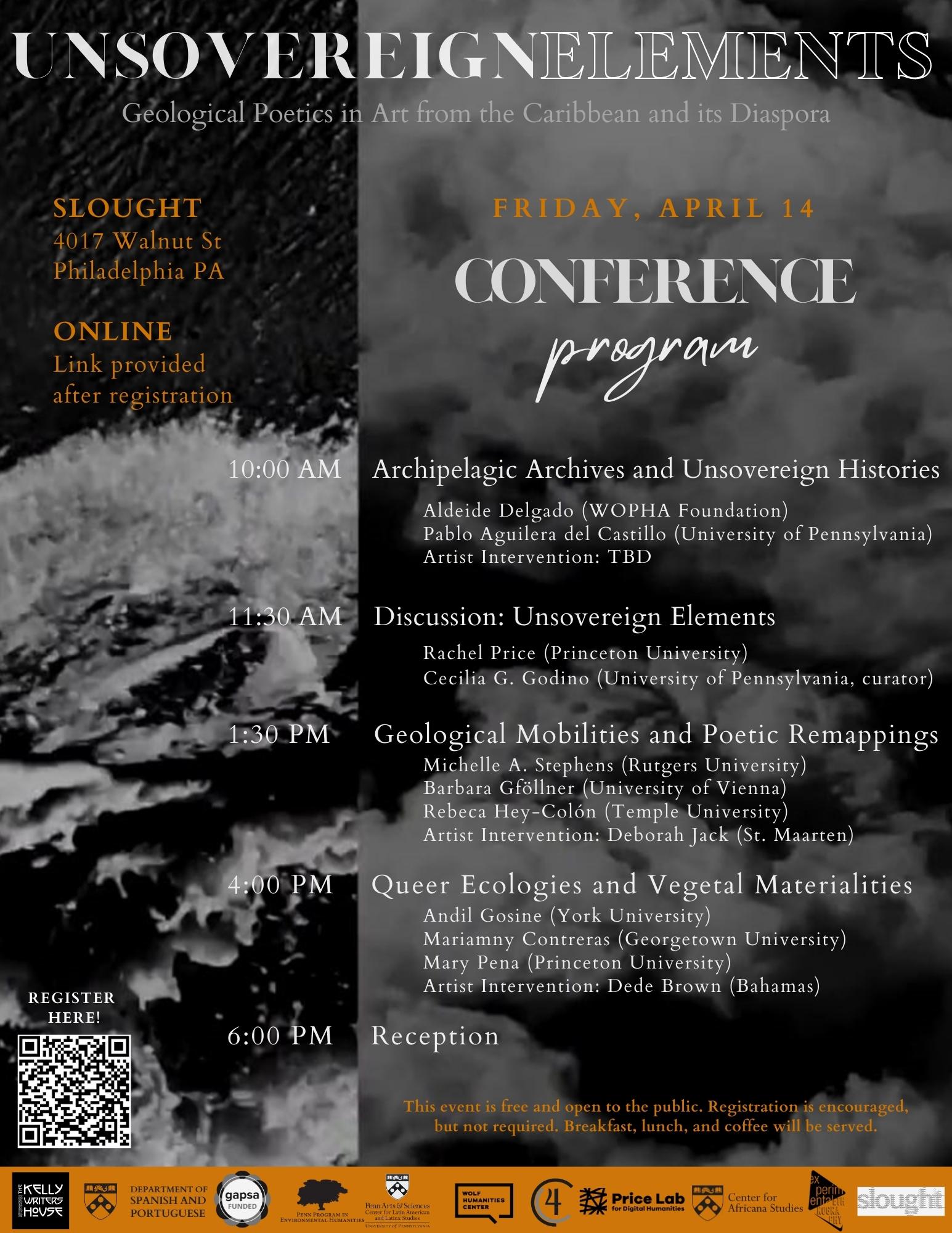Unsovereign Elements: Geological Poetics in Art from the Caribbean and its Diaspora - Hybrid Symposium
Slought

(Access the conference program here or on the document attached)
Part of a larger project featuring a series of film screenings, several workshops, and an exhibition on view through May 10, 2023, this conference aims to create a space for discussion where academic, curatorial, and artistic perspectives on the Caribbean and its diaspora are in conversation. We invite you to join us for these programs, which are hybrid, free and open to the public, and culminate in a full-day symposium at on Friday, April 14, 2023 from 10am-6pm. Breakfast, lunch, and coffee will be provided. Register here for in-person & online attendance!
Featured speakers include Aldeide Delgado (WOPHA Foundation), Rachel Price (Princeton U), Michelle Stephens (Rutgers U), Rebeca Hey-Colón (Temple U), Andil Gosine (York University), Mary Pena (Princeton U), Cecilia González Godino (UPenn, curator), Pablo Aguilera del Castillo (UPenn), Barbara Gföllner (U of Vienna), and Mariamnny Contreras (Georgetown U). With artist interventions by Deborah Jack (St. Maarten) and Dede Brown (Bahamas).
Caribbean cultural products and critical approaches are highly permeated by submarine, geological and atmospheric aesthetics, too often enclosed within frameworks of unavoidable catastrophe or fetishized tropicalism that posit the geological as either a destructive or a picturesque force. Starting with colonization and the invention of the Americas, geological elements were relegated—and still seem to be—to a fossilized backdrop status, defined and configured by modernity as epistemological vacuums, decorative backdrops, or disaster vectors whose sole purpose was to be traversed, extracted from and commodified. These dynamics have contributed to the traditional and utterly colonial image of the Caribbean archipelago as a linguistically, geopolitically fragmented entity, even though oceans, hurricanes, currents, and other natural phenomena are inapprehensible totalities that extend far beyond their materiality and beyond binary formulations of human-nature relations. They can never be contained within borders or even within national narratives, yet they do participate in the archipelagic production of identity and they inhabit the periphery of narratives of independence, statehood, and colony.
Artists engage with geological elements from the premise that the visual economies of the Caribbean are colonizing projects in themselves whose efficiencies and inefficiencies can be seen trans-historically. And one of the most effective geo-visual strategies has been to codify the Caribbean from its "islandness", from the difference between its fragments, without paying attention to the fact that geologically and historically these islands/fragments tend to a totality. Undoubtedly, colonial projects benefited from this material and conceptual isolation, more or less conditioned by visual technologies, to facilitate center-periphery relations of extraction and imperial networks of mobility.
Unsovereign Elements intends to create an archipelagic space of representation that moves away from master narratives—in this case, imperial narratives of sovereignty—and has the diasporic potential to expand to the global without erasing its local dimensions. The Caribbean archipelago is a region with unique circumstances, both in the organization of sovereignty and as a climate emergency zone, and yet it is still divided by the nations, the language, and the history of its colonizers. To decolonize and to deconstruct the way in which these elements are conceptualized and to revalorize their poetic potential not only would integrate them as a constituent part of history, but would allow for a geological, non-anthropocentric, non-linear account of Caribbean history.
The Unsovereign Elements exhibition features 11 artists that examine the ambiguous role of geological elements in the (re)production of the Caribbean archipelago--certainly exhausted by modernity as discursive instruments, yet always retaining a poetic potential that far exceeds their materiality. Drawing from these ideas as starting point, the programs establish the notion of "unsovereignty" and the "unsovereign" as an open category for every body of flesh, of nature, and of knowledge whose power resides not in its figurative and conceptual agency, but in its ecological and relational agency.
Featured artists include:
-- Deborah Jack (St. Maarten)
-- Dede Brown (Bahamas)
-- Jamilah Sabur (Jamaica)
-- Johanna Castillo (Dominican Republic)
-- Joiri Minaya (Dominican Republic-US)
-- Kelly Sinnapah Mary (Guadeloupe)
-- Lilian Garcia-Roig (Cuba-US)
-- Nadia Huggins (St. Vincent)
-- Sofía Gallisá (Puerto Rico)
-- Tessa Mars (Haiti)
-- Thelma Vanahí (Dominican Republic)
These programs are co-sponsored by the Center for Latin American and Latinx Studies (CLALS), the Center for Experimental Ethnography (CEE), the Center for Africana Studies (CAS), the Penn Program in Environmental Humanities (PPEH), the Price Lab for Digital Humanities, the Wolf Humanities Center, and the Gender, Sexuality, and the Women's Studies Program at the University of Pennsylvania. Special thanks to the Campaign for Community (C4C), the GAPSA-Provost Fellowship for Interdisciplinary Innovation, and the Writers House Student Initiatives Fund for their generous support.
Follow Unsovereign Elements on Instagram!
